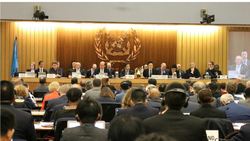IMO's pollution chief says environmental barriers will trump trade

IMO official is confident the sector is well prepared for the 2020 sulphur cap — despite acknowledging there will likely be implementation issues at the start — and stresses to governments that regulatory certainty will be necessary if the organisation is to maintain credibility.
Edmund Hughes tells the shipping industry that environmental regulations are a ‘different animal’ when compared with most other regulated sectors and that governments are judging the shipping world differently than they have hitherto
THE IMO IS REVIEWING EXHAUST GAS SCRUBBERS ON SHIPS.
TRADITIONAL shipping activity and norms will be challenged as “environmental protection is going to trump trade”, the head of the International Maritime Organization's environmental regulation warns.
Edmund Hughes, the IMO’s head of air pollution and energy efficiency, said governments will demand adherence to stringent regulations to allow ships in their waters, under an emerging global reality.
“We still, as a sector, think that this right of innocent passage will go on forever,” he told Lloyd’s List. “I am afraid that is going to be increasingly challenged.”
His caution comes amid a dispute over the use of scrubbers to meet the introduction of a 0.5% sulphur cap in 2020.
While some strongly support and have invested in the technology others, including some countries, claim it harms the aquatic environment and want to see exhaust gas scrubbers banned.
Mr Hughes said the available evidence on scrubber impact is conflicting. Ultimately, it will be up to governments to decide what they want.
But from the wider context of environmental regulation, especially shipping’s decarbonisation commitments, the senior IMO official said that both the industry and regulators have to realise they are dealing with “a different animal”, whereby governments have a much broader perspective than they may have had for maritime regulations historically.
“People in the sector have to understand that. We are part of a much bigger, bigger picture,” he said. “And it could be that when it comes to things like with the fuels, it is what happens outside the sector that is more important than what happens than in the sector.”
Being part of the larger picture in the immediate term means living under a global 0.5% sulphur cap on vessel emissions effective from January 1.
Mr Hughes does not expect implementation to go perfectly, but did argue the industry is where he would have expected it be at this point; the compliant fuels are becoming available to the market in the fourth quarter and companies are testing them.
“There may be localised issues in terms of the smaller ports but we fully expect for the large trading vessels, ships and operators to be able to comply because there will be fuel available,” he said.
Over the past year dissent against the new sulphur limit has largely died down and the industry has widely accepted this new challenge cannot be reversed. But there are those who still express concerns about the transition.
Intercargo, the main dry cargo owners association, has been consistently vocal about its fear over the problems tramp shipping could face, with its unpredictable schedule, in finding compliant fuel globally.
Mr Hughes said that if such concerns were more widespread IMO would need to seriously consider them.
“But at the moment there are one or two voices we feel have concerns- maybe rightly have concerns. But I don’t see that as a reason for the organisation to stop doing what is doing and taking the matter forward,” he said.
Concerns also persist from some industry corners on the safety implications of the new fuels and some have privately expressed that this factor has been overlooked.
For Mr Hughes, however, the IMO — and even the industry itself — has done enough to assuage those concerns; three years of preparations, several implementation guidelines and continual communication from industry bodies and the IMO.